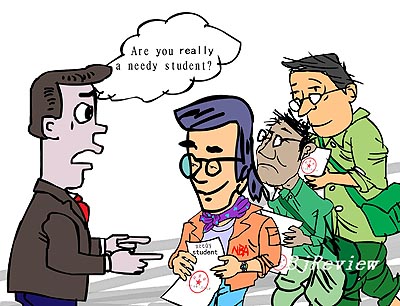
For years, the government has offered financial aid based on either testimonials given by poor students themselves, or evidence from local governments proving the applying students live in poverty. It has subsequently been found that some students, who manage to get government financial aid through the above methods, are not poor at all. In some cases aid recipients have an even better lifestyle than well-off students.
It's a tricky juggling act, as on one hand, financial resources are limited; on the other hand, a large number of students need the aid to finish their college education. A solution needed to be found, and quickly.
In July, the Ministry of Education announced strict new regulations would be adopted to check the living conditions of students applying for study aid. According to the new procedure, an investigation team will be set up, composed of students at the same grade and departments as those applying for financial aid. The team must include at least 10 percent of the department's students. This means, applicants' classmates will have the right to decide whether he or she is poor enough to receive aid, by investigating their family and living conditions.
Some believe that this will make the process more transparent and the result fairer, while others say it is unreasonable. After all, not all applicants are dishonest, so is it necessary to set up such an investigation team just because of a few bad apples? Besides, generally speaking, people don't want their poor living conditions to be exposed to the public and no one would like to be labeled as a "needy student." This procedure, therefore, could cause psychological damage to genuinely impoverished students.
Unfair for peers to decide
Wang Yuchu (www.zjol.com.cn): If a student is confirmed to be living an impoverished life, they may receive financial aid, but how will they feel about this? Poverty is not the student's fault, and no one would like to admit they are poor to their classmates. Also the possibility exists that the recipients may feel obliged to the students whose decisions got them the aid.
More importantly, if the student is not judged to be from an impoverished background, how are they expected to then get along with the classmates in the days ahead? It's also possible that classmates may pronounce a student poor, only to maintain their friendship. This undermines the entire system.
The question must be asked, why so many students who have money would want to deny it to those in need by applying for it themselves? One of the reasons is that there are many families that are actually not poor, but may fall into the poverty trap if they were to pay the high education tuition fees. With the financial aid they can still live a good life. As a result, many students will compete for the money and the system becomes a test of morality.
In my opinion, it's unwise to grant the decision rights to common students. Rather but the universities should organize special investigation groups and cooperate with local governments to check the real living conditions of the impoverished students.
Xiong Bingqi (Oriental Morning Post): Sometimes, it does happen that "impoverished students" are not poor at all, but is it necessary to set up an investigation team composed of students to prevent such fraud?
The investigation team can make the call as to whether the applying student qualifies to receive aid or not. But what determines whether a student is poor or not?
Moreover, in some sense, the involvement of the team will make it more difficult for impoverished students to receive financial aid. As far as impoverished students are concerned, the simpler the applying procedure is, the better. This complicated procedure has already discouraged many poor students from applying for aid. It seems that universities are afraid that students are all dishonest. If the investigation team is set up, the procedure will become even more complicated. It's unreasonable to make the financial aid more inaccessible just because of some students' deception.
Tang Jun (The Beijing News): Generally speaking, impoverished students should apply for financial aid to the government, rather than to schools and thus it should be the government that checks whether a student can receive the aid. "Democratic voting" among students seems improper.
Poverty is obviously something private, which should not be brought to public attention, especially when the public is one's classmates. If a college student can only receive financial aid by telling every classmate of their living conditions, it seems that they are begging for help. It's inhuman and improper.
| 